News: iAIM 2023: Embrace AI, Empower Doctors, Elevate Patient Care
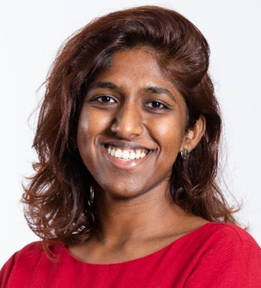 | By Retna Dev, Acting Editor, The LKCMedicine |
Why is the adaptation of AI in healthcare slow? Is AI a threat or an opportunity for the healthcare workforce? Are patient outcomes indeed going to get better with AI? How would an AI-integrated curriculum look like in medical universities?
These were some of the many probing and provocative questions that were raised during the eagerly anticipated International Conference on AI in Medicine 2023 (iAIM 2023) that was held from 5 to 7 August 2023. Co-organised by LKCMedicine with the College of Engineering, NTU Singapore, and the National Healthcare Group (NHG), the inaugural conference brought together clinicians, scientists, engineers, AI experts and students, to explore the promise and challenges surrounding the impact of AI on medicine and healthcare, and to spark collaborations across disciplines.
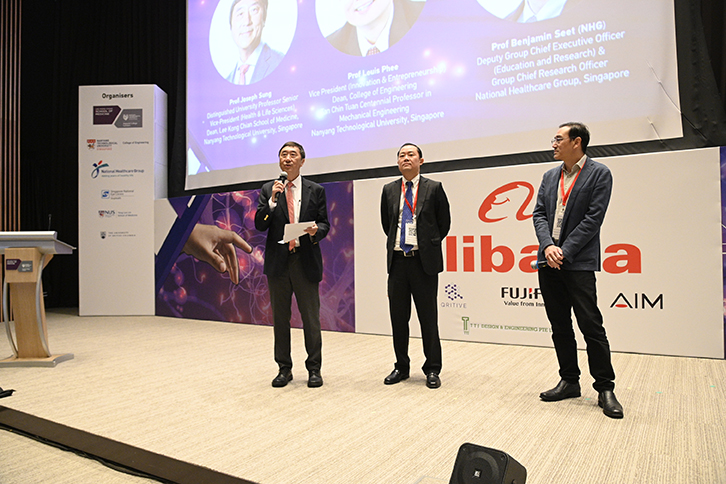
Held at LKCMedicine’s Novena Campus, iAIM 2023 kicked off with the three Co-Chairs, LKCMedicine Dean and NTU Singapore’s Senior Vice-President for Health & Life Sciences Distinguished University Professor Joseph Sung, College of Engineering Dean and NTU Singapore’s Vice President (Innovation & Enterprise) Professor Louis Phee and NHG Deputy Group CEO (Education & Research) Professor Benjamin Seet, priming the some 600 attendees for three days of riveting discussions and insights in their welcome remarks.
The fully packed Ong Tiong Tat & Irene Tan Liang Kheng Auditorium was charged with excitement as the Co-Chairs officially launched iAIM 2023.

In his opening remarks, Chairman of LKCMedicine Governing Board Mr Lim Chuan Poh said, “It gives me great pride and pleasure that this medical school, the youngest of three in Singapore and only 13 years old this year, is hosting such a distinguished audience at this inaugural international conference on AI in Medicine.”
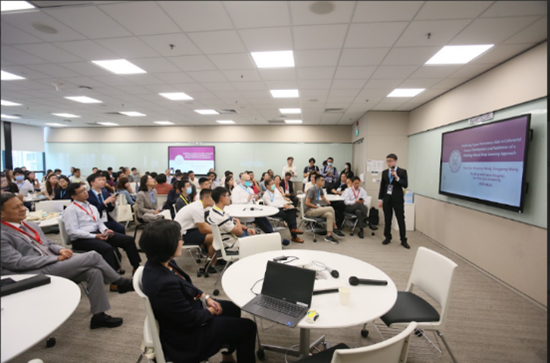
With the Conference featuring 11 keynote addresses, two panel discussions, nine symposiums, four workshops and two tutorials with international and local experts, iAIM 2023 left almost no topic untouched.
Day 1 Highlights

Chairman, Medical Board of Tan Tock Seng Hospital Professor Jing Jih Chin delivered a stirring keynote on the challenges and promises of AI, investment needed to proliferate and apply AI wisely, while being mindful of healthcare workers’ and patients’ psyche. Ultimately, the approach we should adopt is prudent optimism to see both sides of AI in medicine, and not solely focus on the hype.

Founder of DeepLearning.AI Professor Andrew Ng enthralled everyone at the iAIM fireside chat on the challenges of navigating regulatory hurdles and building bridges for AI-Preneurs and healthcare professionals.
It was another full house keynote session at “Ethics of ChatGPT” by National University of Singapore’s Chen Su Lan Centennial Professor in Medical Ethics Julian Savulescu. His profound thesis on ChatGPT dialogue with ethics, values and morality included an insightful discussion on the trolley dilemma.

Dr Le Song, BioMAP’s Chief AI scientist, added to the multi-faceted discussions of the day by drawing out the role of pre-trained AI Models for target discovery and drug design. While the road is still long, the benefits, previously unimaginable, are in sight due to the many innovations taking place.

One of the iAIM 2023 crowd-puller events was an insightful panel discussion featuring Guest-of-Honour Minister for Manpower and Second Minister for Trade and Industry Dr Tan See Leng, Director-General of Health, Ministry of Health Professor Kenneth Mak, School of Computer Science & Engineering, NTU Chair Professor Miao Chun Yan and Co-founder and Chief Executive Officer, MiRXES Dr Zhou Lihan. They delved into the role of regulation and policy, the need for it to keep pace with AI innovations, job displacement as well as the crucial role of good data practices in producing high-performing AI tools.

In the fifth keynote address, Medical Director, HealthlinkBC Emergency iDoctors in Assistance (HEiDi) Professor Kendall Ho from University of British Columbia illustrated the accelerated use of digitisation in emergency medicine due to the COVID-19 pandemic, paving the way for AI solutions in the Emergency Department.
Vice Provost of Tsinghua University and NTU Nanyang Professor of Practice (Clinical) Professor Wong Tien Yin, the sixth keynote speaker, called for educators and healthcare professionals to look beyond existing frameworks by transforming medical education into an AI-integrated model, not just AI-assisted. He also imagines a new career in medicine: Clinician-AI Scientists.

Last and certainly not the least was Prof Sung’s keynote address which outlined 14 Position Statements of the Singapore AI for Gastroenterology Working Group. He hopes that we will arrive at a stage in patient care where AI is trusted, legal, safe, fair, and non-discriminatory of the patient.

After a full day of invigorating speeches and thought-provoking discourse, conference speakers and guests were treated to a delightful reception at the School plaza. With full minds and stomachs, they look forward to the second day of iAIM 2023.
Day 2 Highlights
Despite being a Sunday morning, attendees packed the auditorium for another day of thought-provoking insights on AI-driven diagnostics, machine learning, surgical breakthroughs, patient-centric approaches and medical education revamp.

Day 2 of iAIM2023 started with an energising conversation with Professor Prateek Sharma, President-elect of the American Society for Gastrointestinal Endoscopy. He shared with the audience what AI can do in Gastroenterology to reduce missed-rate, improve endoscopy quality, documentation and clinical care coordination as well as in education.

This was followed by Professor Dean Ho, Director of NUS Institute of Digital Medicine (WisDM) highlighting the exciting work on using powerful AI-based approach to achieve life-saving patient outcomes in oncology and harnessing patient data to optimise care.

The parallel symposiums on “Evidence of Clinical Benefits of AI tools” (Symposium 4), “AI in Patient-centered care: The human touch” (Symposium 5) “and Affordable AI for Medicine” (Symposium 6) were well attended. Speakers at each symposium shared their perspectives, projects and case-studies on the different aspects of how AI impacts healthcare.

Attendees learnt more about how AI can transform the future health system with Professor Tan Chorh Chuan, Executive Director of MOH Office of Healthcare Transformation (MOHT). He outlined how AI can help to make the big moves needed in future health for better outcomes. This includes using AI to work with individuals and groups to adopt and sustain healthy behaviours and treatment, enhance health professional enablement, develop precision public health to keep the population healthy and disease burden down and develop enhanced approaches for mental health.

The last keynote on Day 2 saw Sydney University’s Professor Tao Da Cheng extrapolating the profound impact of deep learning, driven by vision foundation models and enabling precise quantitative motor assessments.
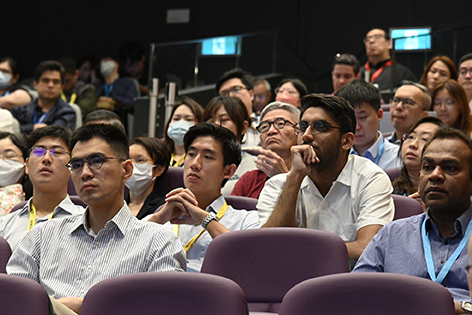
Having learnt much about how AI can be used in healthcare throughout the conference, the second Panel Discussion tackled hard questions of what is needed in medical education and training for future healthcare providers to keep pace with the AI revolution. Associate Professor Michelle Jong, Group Chief Education Officer of NHG and the President of the National Healthcare Group College, Prof Wong, and Professor Simon Kitto of Lee Kong Chian School of Medicine, NTU highlighted how this will require change at the core and from the bottom, a strong will and buy-in from leadership and all stakeholders.

Day 2 ended on a high note with the Best Poster and Best Oral Presentation Awards. Six winners were selected from 77 quality submissions. Congratulations to the winners!
 Day 3 Highlights
Day 3 Highlights
On the final day of iAIM 2023, attendees remained eager to soak up fascinating perspectives from AI thought leaders and experts.
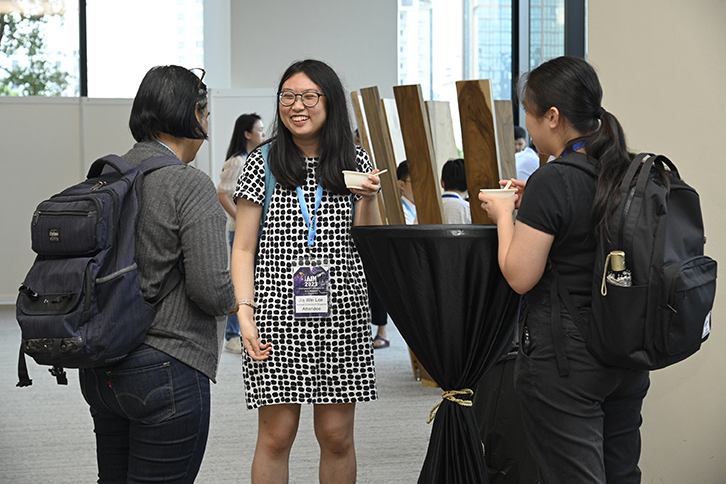
Day 3 commenced with Dr Aleksandra Mojsilovic, Head of Foundations of Trustworthy AI, IBM Research, the last keynote speaker of the conference. A renowned scientist, she provided a thorough exploration into Trustworthy, Safe and Beneficial Foundation Models.

Shifting away from the format of the first two days, the rest of the conference comprised a series of workshops and tutorials to facilitate deeper conversations for smaller breakout groups. The discussions that ensued revolved around “AI for Ageless Ageing,” “Aligning Large Language Models and Medicine,” “Explainable AI and Mātauranga Māori For Diagnosis and Prognosis in Mental Health,” “Intensive Care Unit Smart Brain,” “Harnessing the Power of Large Language Models in Clinical Medicine,” and “Innovations in Life Science Tools and Applications in Genomic Analysis and Imaging”.
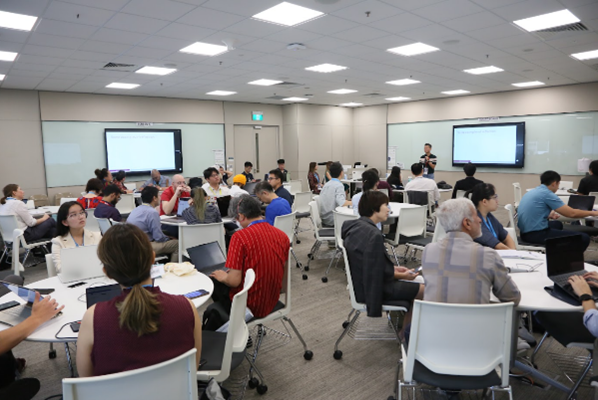
The workshops and tutorials were highly subscribed, with the respective speakers bringing their different perspectives to the table and fielding questions on how to perceive AI and utilise it for the betterment of society and healthcare.

The many takeaways from iAIM 2023 will encourage attendees to continue reflecting on the nuances of interacting with AI in medicine. The organisers are especially pleased that iAIM2023 has paved the way for exciting collaborations in AI for Medicine and healthcare.
These sentiments were echoed by Chairman of LKCMedicine Governing Board Lim Chuan Poh who noted, “The topic of [the conference] is a very important and timely one because AI is pervasive in all aspects of our lives. It is important, especially for Singapore, to harness the latest technology to make life better and make things more productive.”
| Word on the street: Attendees share their experience “An event like this brings together all the disciplines. For AI to work in medicine, it has to be interdisciplinary. I spoke to different people here, and the beauty is that everyone is up to speed on AI. So, I can’t tell if I am talking to an engineer, a medical doctor or a computer scientist, and that is great!” - Professor Louis Phee Dean, NTU College of Engineering and NTU Singapore’s Vice President (Innovation & Enterprise) “To be able to have a forum that brings people from different backgrounds and disciplines is extremely important because it provides a venue and platform for an exchange of ideas. I think these conversations won’t take place in a normal work environment. It is important for us to bring them together, to not only share their views and perspectives, but for everyone to understand what the technology is capable of, what the issues of implementation are, and what the on the ground, real-world problems that need to be solved are as well.” - Professor Benjamin Seet Deputy Group CEO (Education & Research), National Healthcare Group “AI in medicine is going to be a field that is going to develop very fast, in particular Singapore. We are a knowledge-based economy and we have the infrastructure to develop this area. The key thing is for the healthcare family and industry to become more familiar with AI and to gradually invest in and develop AI models. Also, to get the acceptance and momentum we need to deploy AI systems so that we can gradually develop into what we call an intelligent health system.” - Professor Jing Jih Chin Chairman, Medical Board, Tan Tock Seng Hospital “Today, we have so many different approaches and tools to improve health outcomes and delivery. AI and data are very critical to many of these transformative changes and therefore this conference is very timely and useful in that it brings together people from many disciplines to have the type of discussions that are needed to see how challenges and opportunities of healthcare and outcomes can benefit and leverage the advances of data analytics and AI. I want to congratulate the organisers for putting together an excellent programme.” - Professor Tan Chorh Chuan, Executive Director, MOH Office of Healthcare Transformation “This conference has brought together many diverse groups of people who are interested in pushing the boundaries of AI and incorporating AI into our healthcare practice and medical education, research, and policy. I think it is a fantastic conference, and we hope to see many more such conferences with participants from the public and private sectors to universities and hospitals to young doctors interested in this and very senior people thinking of the future of our healthcare system.” - Professor Wong Tien Yin Vice Provost, Tsinghua University and NTU Nanyang Professor of Practice (Clinical) "As a student stepping into my clinical years, the conference provided me with valuable insight into the breadth and depth of the nexus between artificial intelligence and various aspects of healthcare delivery. This has spurred me to develop my competencies in harnessing AI to augment clinical medicine, to grow into a future-ready clinician empowered to face the vicissitudes of an evolving healthcare landscape with unprecedented advances in technology.” - Loh Pei Yi Year 3 LKCMedicine student “Conferences like iAIM 2023 bring together clinicians and researchers, allowing us, students, to bear witness to the process of translating emerging technologies to clinical practice. Furthermore, exposure to current research can give us a better idea of how the practice of medicine will change by the time we graduate rather than solely relying on textbooks, which usually take longer to be updated. It is also a great networking opportunity. Along with two teammates from other universities, I am in the midst of testing an AI-assisted pre-Triage system that reduces waiting time and increases efficiency at the Emergency Department by obtaining, assessing and condensing patient information before they arrive at the hospital. The conference gave us a chance to showcase our work to a much larger audience, including several who took an interest in the project and were willing to work with us to develop it further. Such experiences certainly nurture the innovative spirit of LKCMedicine students.” - Matthew Tham Year 3 LKCMedicine student |
|---|
